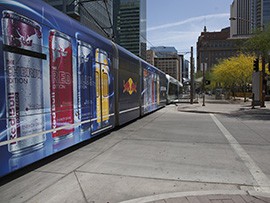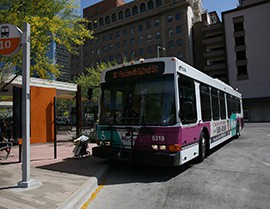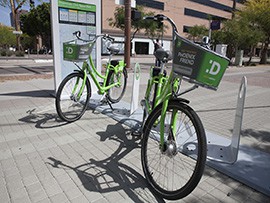Cronkite News has moved to a new home at cronkitenews.azpbs.org. Use this site to search archives from 2011 to May 2015. You can search the new site for current stories.
Phoenix transit tax supporters must convince voters of benefits
Officials have had mixed results when turning to Valley voters to approve various transportation taxes during the past two decades.
In the 1990s, Maricopa County, Phoenix, Scottsdale and Chandler voters rejected measures, according to Friends of Transit, an Arizona nonprofit representing regional transportation.
But since 2000, Phoenix, Mesa, Peoria, Glendale and Maricopa County voters supported various efforts.
To continue that steak, the organizers of MovePHX, the group tasked with promoting Phoenix’s latest transportation plan, will need to convince voters that the city’s proposed 0.70 percent sales tax is worth it.
They have until August to make their case to the city’s more than 647,000 voters. They’ve launched a website, Facebook page, Twitter and Instagram accounts promoting the 35-year transportation plan. The group’s pitch: The transit plan aims to put Phoenix on the map as a modern city that would attract new businesses, connect education hubs and ease congestion as the city makes repairs to aging streets.
Sapna Gupta, senior policy analyst with the Morrison Institute for Public Policy at Arizona State University, said the plan has a good chance at passing.
But the measure faces early criticism. Americans for Prosperity, a free market activist group, said the transit plan does not support the general public.
And Phoenix City Councilman Jim Waring, who voted against sending the measure to the ballot, said the plan needs adjustment. He said the plan should put more money toward adding more lanes on the freeway instead of light rail expansion.
Phoenix shoppers currently pay a 0.40 percent tax supporting public transit, approved in 2000.
However, the program has collected $1 billion less than anticipated, according to a city council report.
With the tax set to expire in 2020, the city needs a new transit plan.
Mayor Greg Stanton appointed the Citizens Committee on the Future of Phoenix Transportation to review public transit and street transportations needs and come up with a solution.
The committee’s proposal is anticipated to raise about $31.7 billion through 2050. The City Council sent the measure to the ballot on March 3.
With voting just around the corner, Gupta said voter education is crucial.
Gupta said misconceptions of the tax could keep the transit plan from succeeding. However, she said voters who think the transit plan does not affect them should take another look.
To make her case, she pointed to the economic impact of light rail. Since the advent of the system, there’s more business development and higher property value along the light rail corridor. As of March, the total development investment made along the light rail line is about $7 billion, according to Valley Metro.
Gupta said that while some complain that the transit tax could compete for potential education funds, she said that’s not necessarily the case. Those funds can come from different revenue sources, she said.
She said improving transit could actually help education by providing accessibility to educational institutions to those without other modes of transportation, she said.
Richard Stanley, senior vice president and university planner at Arizona State University, said the university supports the transit plan.
He said the light rail expansion opens up more educational opportunities for students to visit other campuses and could also decrease the amount of buses on the streets.
However, some critics said the plan has the wrong priorities.
Arizona Director of Americans for Prosperity Tom Jenney said he’s concerned the transportation plan will waste money on a form of transportation, the light rail specifically, that only a small portion of the Phoenix population uses.
“To really help out the people in Phoenix and increase mobility in our city, we need to focus on the 99 percent of people out there who are driving their cars, using ride shares or bus transit to get around,” Jenney said.
Jenney said instead of funding light rail, Phoenix should spend more on street repairs, widening roadways and expanding bus transit.
The transit plan allocates a portion of the funding toward street repairs, including street overlay on 750 miles of roadways, maintenance, 1,150 new bicycle lane miles and 170 miles of new sidewalk.
Yet those improvements did not entice one Valley resident.
Aleksandr Mikityanskiy, a computer programmer at The Arizona Republic and Phoenix resident for more than 10 years, said he’s against the transit tax for multiple reasons.
While he’d vote for a public education sales tax increase, he said the transit tax would not benefit him.
His property tax has hiked up in the last few years, and he said that money spent toward additional light rail and bike lanes is wasteful.
“It’s going to get hot in a few months,” Mikityanksiy said. “No one will be out riding bikes.”









